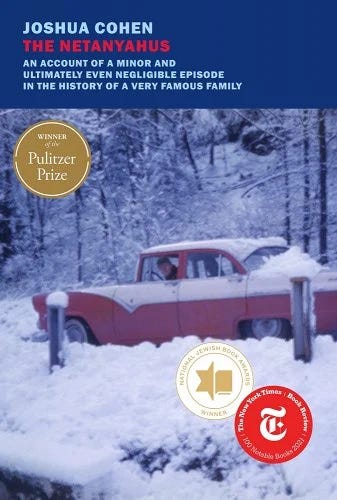Last year, The Washington Independent Review of Books asked me to name the favorite book I’d read in 2022 and I chose, The Netanyahus: An Account of a Minor and Ultimately Even Negligible Episode in the History of a Very Famous Family by Joshua Cohen. At the time, this beautifully written academic novel set in the 1950s was widely seen as an exploration of right wing political celebrity that used a historical anecdote to comment on the rise (and fall and maybe rise again) of Donald Trump in American politics.
A problem with Trump, and a source of his power, is that he draws conversation towards him, like a black hole so powerful that no thought can escape his influence. For many Americans, Trump is so beyond the norms of American politics that his success requires a special explanation that generally involves some combination of celebrity culture and propaganda that slips into brainwashing. It’s all part of a comforting fantasy where Trump was inflicted on Americans, rather than something Americans did to themselves.
But Trump doesn't factor into The Netanyahus at all. Heck, the present front-runner for the Republican presidential nomination factors more into his party’s primary debates (which he has ignored) than he does this novel set in the 1950s, inspired by anecdote told to its author by the great classical scholar Harold Bloom. If we take The Netanyahus at its words, it is about the father of current Israeli prime minister Benjamin “Bibi” Netanyahu, who shows up as a character in this book — among the three uncontrollable sons of Polish-born Benzion Netanyahu, a Polish/Israeli scholar visiting America on an academic and fundraising trip.
In real life, Benzion visited Bloom at Cornell in 1960. In the fictional account, he visits Corbin College in upstate New York, where he is hosted by Ruben Blum, a history professor and the school’s only Jewish faculty member. Rather than stretch the novel into an allegory about Trump, it should be read for what it is — an early interaction between the American public and the intellectual and political leaders of what is contemporary Israel.
This will sound like a bit of an Us Magazine observation, but in a culture of political celebrity, we do often forget that politicians are just like us, that they have families and domestic lives and that they make friendships and connections that are often small and local but that give them power later. They have fathers who teach them life lessons and help shape their world views. The roots of power show up in small colleges in small-town New York long before its branches show up on the ski slopes of Davos or the glitzy events of the World Economic Forum.
The Netanyahus is a domestic book, an academic novel and a bit of a farce, with many laughs that’s ably told and quick to read. It offers insight into the background of one of the world's most influential leaders and it gives readers a sense of the existential mindset of Benjamin in 2023. A book like this reminds us how seemingly obscure ideas about history, religious and demographics can form the basis of decisions made much later, to great consequences.
There is also more in The Netanyahus that is useful than in any news story or editorial you will read today, as the conflict between Israel and Hamas continues into what some, including Netanyahu, are warning could be a long war that involves an occupation or Gaza (whether that charged word is used or not).
Now is the time where a well-crafted work of fiction can inform in ways that the news and essays cannot. Let’s face it, there is no editorial to be written, no matter how elegantly crafted, that will put a two state solution back at the forefront and over decades, no public intellectual has emerged who can quell decades of conflict born from injustices experienced throughout world history that have used the land of Israel and Palestine as a stage since before the 20th century.
Throughout the world, but particularly in the United States, people are losing editorial, academic and corporate employment for expressing opinions about the ongoing conflict between Israel and Hamas. The issue is full of traps and historical detail. Innocent-seeming statements can offend people greatly. The Middlebrow, for example, uses the word “Palestine” even though there are knowledgeable and well-meaning people involved in the discussion who will argue that while Palestinians exist, a country called Palestine does not. The Middlebrow chooses to describe Israel as being at war against Hamas. There are knowledgeable and well-meaning people who believe it goes well beyond that. That’s just the surface of things and it’s a digression because my point isn’t to litigate any of this — we all have to pick vocabularies we are comfortable with and with a longstanding issue like this one, with so many eddies and whirlpools, none will be perfect.
My point, instead, is that this is a great time to turn to fiction for insight. You simply do not need to know what the editors of Art Forum think should happen because even if they are right, they have no influence. Every large organization around you, from your employer to your bank will claim to have stakeholders in the region and feel the need to issue a response — you don’t need to hear it. None of it matters. They will not alter history any more than your favorite blogger will.
But a novel like The Netanyahus can tell you something about the characters of the people making consequential choices and that, my friends, is knowledge.
